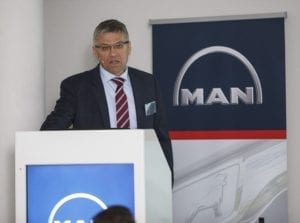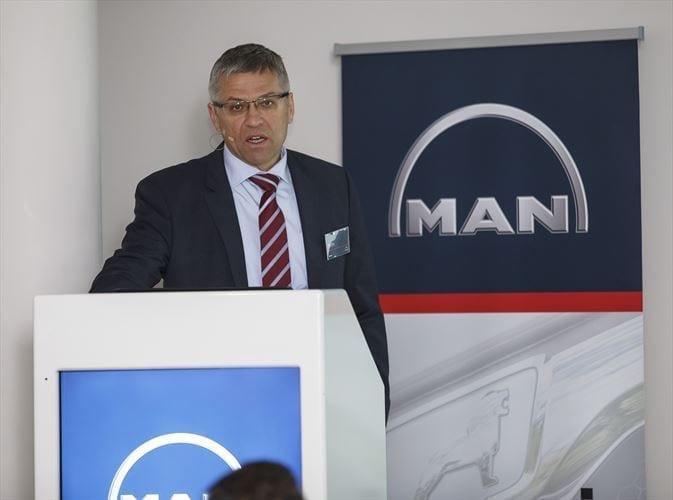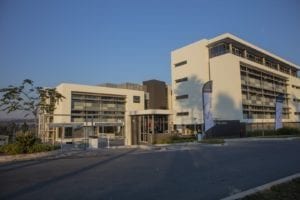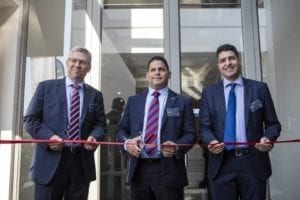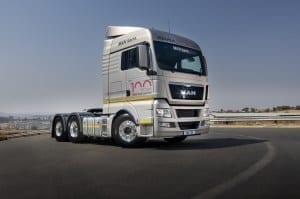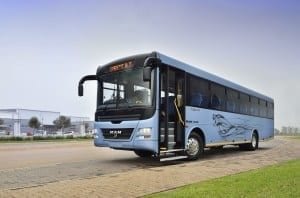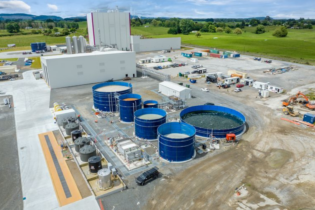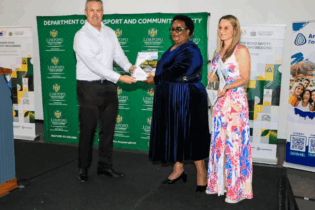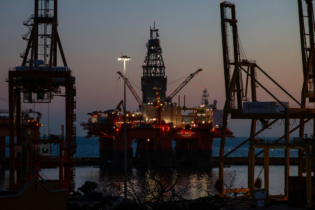Markus Geyer has, since May 1st, held the position of managing director of MAN Truck and Bus South Africa, which is now headquartered in Johannesburg.
Geyer has worked on and off MAN for the last 14 years and has served on the Board as a non-executive director. He has also been involved in sales in the Middle-East and Africa region. “I’m really excited to be here,” he says. “Everything is not new to me, although there are still a lot of things for me to learn. But I’m really excited, and so is my family to move out here.” They will join Geyer in either July or August. Giving an update from a global perspective, Geyer said the MAN Truck & Bus Group, located in Munich, had not changed much in structure. The holding company is still MAN SC, which oversees the two company pillars: MAN Truck and Bus in Munich and MAN Latin America in Brazil. MAN is, of course, 100% part of the Volkswagen Group. Volkswagen Truck and Bus holding have also been created, headed by Andreas Renschler, which incorporates MAN Truck and Bus, Scania as well as MAN Latin America, making it a very large commercial vehicle undertaking.“We needed that kind of synergy in our business in order to create economies of scale and to achieve the global footprint,” Geyer explains.
“These synergies will continue, be it on the purchasing side or on the R&D side,” he adds. MAN remains a leading commercial vehicle supplier in Europe and in many other parts of the world. It currently has a truck range from 7.5 tonnes to 44 tonnes, and there are plans to expand this with a MAN van. “I think you will see more at the IAA this year,” he teases. The van launch – in Europe – is likely set for 2017, with the company considering introducing that product range in various European markets, as well as South Africa. MAN Truck & Bus AG appointed a new CEO, Joachim Drees, in March last year. Drees has worked closely with Renschler in the past. “I think the Board is now complete, it is stable and we feel very confident working with them. We see from Mr. Drees some very nice, in my opinion, strategic initiatives which are taking place and taking shape more and more,” alludes Geyer. “Our corporate values remain unchanged: reliability, dynamism, innovation and openness. This is what we are trying to achieve every day in our work, in our interactions with our business partners and with our customers.” Upping the PACE Drees has already launched a new strategy for MAN Truck and Bus called the Future Line, which consists of three elements: PACE 27, greater market and product focus, and an extended business model that takes longer term views. “PACE 2017 is what we want to achieve. We have to reinvent ourselves all the time. The markets are moving and the competitors are moving. So we have to raise our game all the time.“We have to do things more efficiently, be more customer focused, more flexible and faster.”
This is what we want to achieve with PACE 2017,” explains Geyer. The initiative should be finished by the end of this year, which means that, in 2017, MAN should be able to enjoy the fruits of its labours. “The next step involves introducing new trucks, new buses and also the van, to enlarge our product range. There are significant numbers in the van segment and it’s a lucrative segment as well,” he adds. He says MAN will complete the above step-by-step, market-by-market. It will focus on selected markets around the world, including South Africa. “We believe South Africa has a good future. While there are one or two challenges right now, this country has a lot of potential and can become a hub for other business in Africa,” he says. “We believe in South Africa. Moving into this fantastic building is a statement that we are not hesitating, that we are not going to move out, that we are not disinvesting. No, we are here to stay, we believe in South Africa, and this is shared by the Board in Munich, which is always good news,” he confirms. In terms of the new business model, he says this stems from a changing environment, which includes connectivity, car sharing, and mobility solutions, not just on the car side. “We strongly believe this will be a new reality. The first steps were seen with the introduction of telematics and the professional use of that data a few years ago. I think that is only the very, very beginning of what we are going to see, especially in the car industry, but also in the truck industry. We also believe that in the future, selling a bus or truck is not going to create that much value.“I think it is going to be more and more the services what we and our competitors provide in addition to the hardware.”
We have decided that this is going to be the long-term future and that we must be a major player in it. Being part of the Volkswagen Group provides resources like autonomous driving and connectivity,” Meyer states. MAN has essentially ceased production of buses in Germany, shifting it to Poland and Turkey. “That is working fantastically and I understand the quality levels are right up where they should be. Those two countries are more cost-competitive in bus production because a lot of labour goes in, there is lots of manual work that goes in, and Germany is a high wage country.”The company’s German, Polish and Austrian production plants are important to South Africa as these are potentially where special vehicles come from or where smaller vehicles like the TGL and TGM could originate. The sister company in Brazil, with a plant in Resende, is where the Volkswagen product is sourced from.
“MAN is changing as we penetrate more markets,” Geyer says. “What we saw in 2014/15 in Europe is a robust market. They have had good growth in the market.” Order intake in Europe was up 9%, with truck sales up 7% and bus sales up an incredible 21%, while the company’s turnover also increased by 7%. “You can see the first effects of the PACE programme in terms of our efficiency. Operating profit improved, although it is not near where it should be, but we are definitely on the right track. Also, keep in mind that we get some other extra costs in here for restructuring and so on,” Geyer explains. More than half (56%), of the company’s turnover, comes from truck sales, followed by aftersales which, Geyer says is gaining in importance in terms of turnover, profitability and customer retention. The bus business contributes 12%, with Top Used – MAN’s used vehicles division, adding another 7% to turnover.Geyer explains that MAN defined its brand profile a few years ago, with the three major core elements being efficiency, customer proximity, and product enthusiasm. Efficiency is derived from the company’s efficient line of tools, its product lines, and its telematics.


